Hospitality Operation Management in Marriott International
VerifiedAdded on 2021/01/01
|14
|4108
|53
AI Summary
Contribute Materials
Your contribution can guide someone’s learning journey. Share your
documents today.
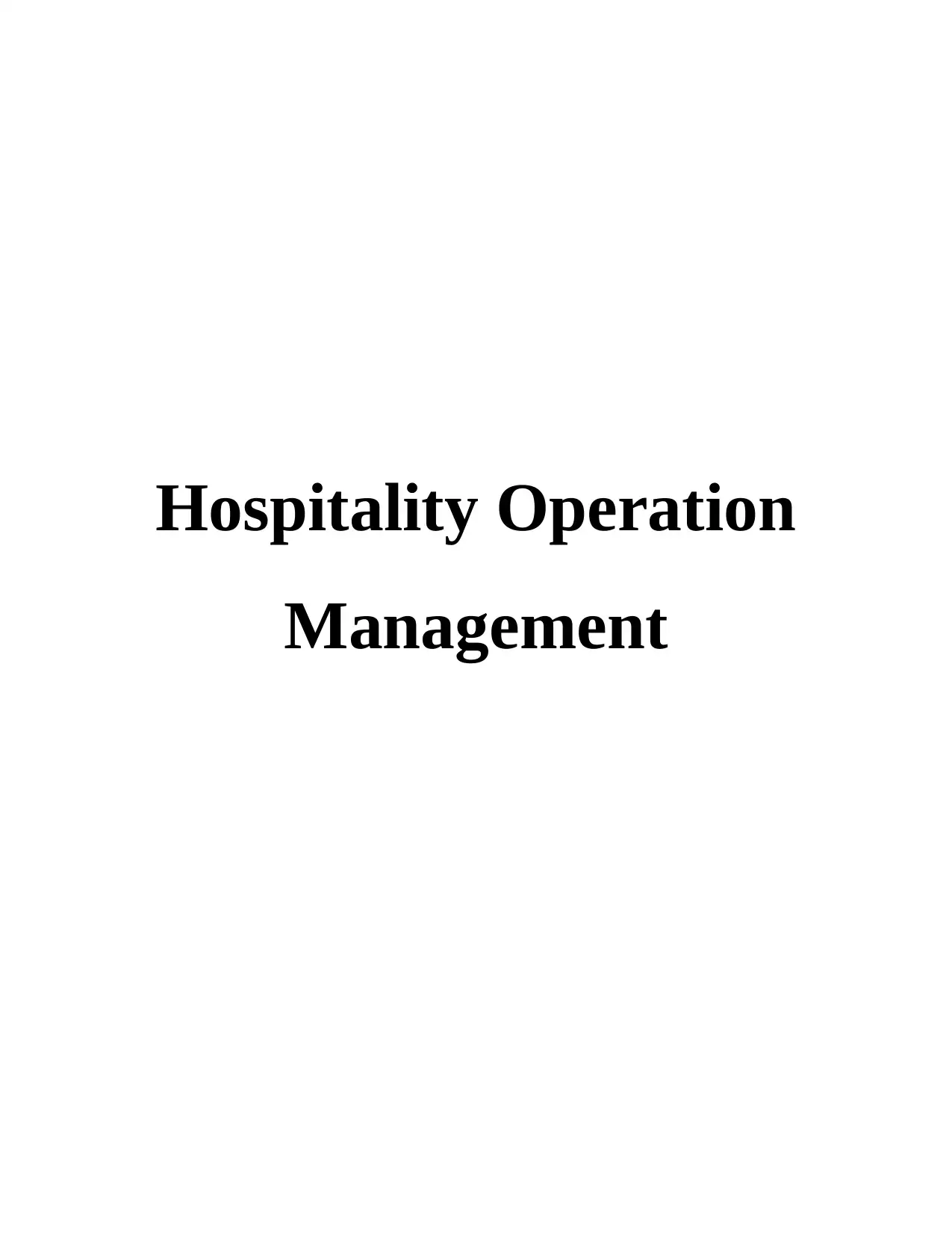
Hospitality Operation
Management
Management
Secure Best Marks with AI Grader
Need help grading? Try our AI Grader for instant feedback on your assignments.

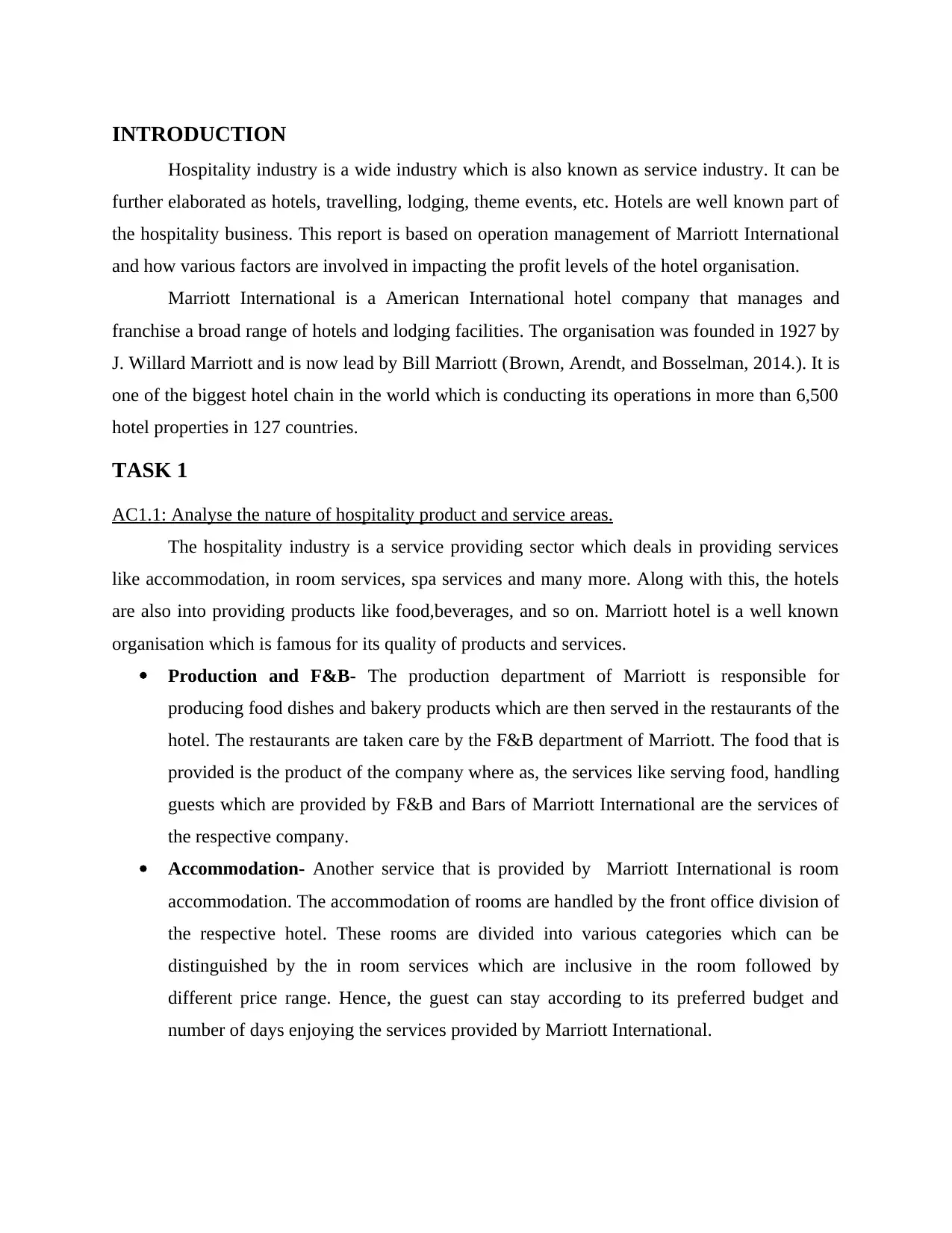
INTRODUCTION
Hospitality industry is a wide industry which is also known as service industry. It can be
further elaborated as hotels, travelling, lodging, theme events, etc. Hotels are well known part of
the hospitality business. This report is based on operation management of Marriott International
and how various factors are involved in impacting the profit levels of the hotel organisation.
Marriott International is a American International hotel company that manages and
franchise a broad range of hotels and lodging facilities. The organisation was founded in 1927 by
J. Willard Marriott and is now lead by Bill Marriott (Brown, Arendt, and Bosselman, 2014.). It is
one of the biggest hotel chain in the world which is conducting its operations in more than 6,500
hotel properties in 127 countries.
TASK 1
AC1.1: Analyse the nature of hospitality product and service areas.
The hospitality industry is a service providing sector which deals in providing services
like accommodation, in room services, spa services and many more. Along with this, the hotels
are also into providing products like food,beverages, and so on. Marriott hotel is a well known
organisation which is famous for its quality of products and services.
Production and F&B- The production department of Marriott is responsible for
producing food dishes and bakery products which are then served in the restaurants of the
hotel. The restaurants are taken care by the F&B department of Marriott. The food that is
provided is the product of the company where as, the services like serving food, handling
guests which are provided by F&B and Bars of Marriott International are the services of
the respective company.
Accommodation- Another service that is provided by Marriott International is room
accommodation. The accommodation of rooms are handled by the front office division of
the respective hotel. These rooms are divided into various categories which can be
distinguished by the in room services which are inclusive in the room followed by
different price range. Hence, the guest can stay according to its preferred budget and
number of days enjoying the services provided by Marriott International.
Hospitality industry is a wide industry which is also known as service industry. It can be
further elaborated as hotels, travelling, lodging, theme events, etc. Hotels are well known part of
the hospitality business. This report is based on operation management of Marriott International
and how various factors are involved in impacting the profit levels of the hotel organisation.
Marriott International is a American International hotel company that manages and
franchise a broad range of hotels and lodging facilities. The organisation was founded in 1927 by
J. Willard Marriott and is now lead by Bill Marriott (Brown, Arendt, and Bosselman, 2014.). It is
one of the biggest hotel chain in the world which is conducting its operations in more than 6,500
hotel properties in 127 countries.
TASK 1
AC1.1: Analyse the nature of hospitality product and service areas.
The hospitality industry is a service providing sector which deals in providing services
like accommodation, in room services, spa services and many more. Along with this, the hotels
are also into providing products like food,beverages, and so on. Marriott hotel is a well known
organisation which is famous for its quality of products and services.
Production and F&B- The production department of Marriott is responsible for
producing food dishes and bakery products which are then served in the restaurants of the
hotel. The restaurants are taken care by the F&B department of Marriott. The food that is
provided is the product of the company where as, the services like serving food, handling
guests which are provided by F&B and Bars of Marriott International are the services of
the respective company.
Accommodation- Another service that is provided by Marriott International is room
accommodation. The accommodation of rooms are handled by the front office division of
the respective hotel. These rooms are divided into various categories which can be
distinguished by the in room services which are inclusive in the room followed by
different price range. Hence, the guest can stay according to its preferred budget and
number of days enjoying the services provided by Marriott International.
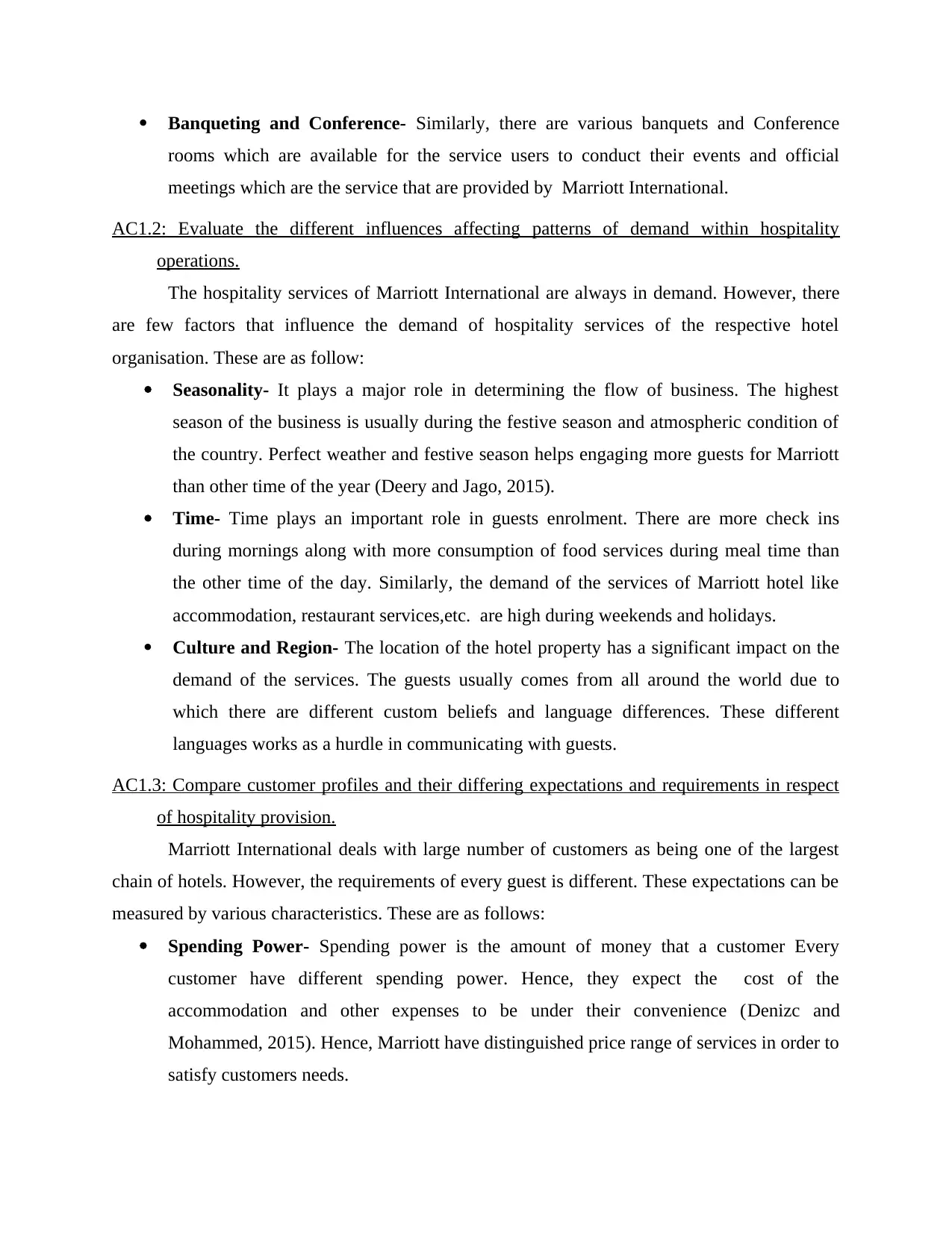
Banqueting and Conference- Similarly, there are various banquets and Conference
rooms which are available for the service users to conduct their events and official
meetings which are the service that are provided by Marriott International.
AC1.2: Evaluate the different influences affecting patterns of demand within hospitality
operations.
The hospitality services of Marriott International are always in demand. However, there
are few factors that influence the demand of hospitality services of the respective hotel
organisation. These are as follow:
Seasonality- It plays a major role in determining the flow of business. The highest
season of the business is usually during the festive season and atmospheric condition of
the country. Perfect weather and festive season helps engaging more guests for Marriott
than other time of the year (Deery and Jago, 2015).
Time- Time plays an important role in guests enrolment. There are more check ins
during mornings along with more consumption of food services during meal time than
the other time of the day. Similarly, the demand of the services of Marriott hotel like
accommodation, restaurant services,etc. are high during weekends and holidays.
Culture and Region- The location of the hotel property has a significant impact on the
demand of the services. The guests usually comes from all around the world due to
which there are different custom beliefs and language differences. These different
languages works as a hurdle in communicating with guests.
AC1.3: Compare customer profiles and their differing expectations and requirements in respect
of hospitality provision.
Marriott International deals with large number of customers as being one of the largest
chain of hotels. However, the requirements of every guest is different. These expectations can be
measured by various characteristics. These are as follows:
Spending Power- Spending power is the amount of money that a customer Every
customer have different spending power. Hence, they expect the cost of the
accommodation and other expenses to be under their convenience (Denizc and
Mohammed, 2015). Hence, Marriott have distinguished price range of services in order to
satisfy customers needs.
rooms which are available for the service users to conduct their events and official
meetings which are the service that are provided by Marriott International.
AC1.2: Evaluate the different influences affecting patterns of demand within hospitality
operations.
The hospitality services of Marriott International are always in demand. However, there
are few factors that influence the demand of hospitality services of the respective hotel
organisation. These are as follow:
Seasonality- It plays a major role in determining the flow of business. The highest
season of the business is usually during the festive season and atmospheric condition of
the country. Perfect weather and festive season helps engaging more guests for Marriott
than other time of the year (Deery and Jago, 2015).
Time- Time plays an important role in guests enrolment. There are more check ins
during mornings along with more consumption of food services during meal time than
the other time of the day. Similarly, the demand of the services of Marriott hotel like
accommodation, restaurant services,etc. are high during weekends and holidays.
Culture and Region- The location of the hotel property has a significant impact on the
demand of the services. The guests usually comes from all around the world due to
which there are different custom beliefs and language differences. These different
languages works as a hurdle in communicating with guests.
AC1.3: Compare customer profiles and their differing expectations and requirements in respect
of hospitality provision.
Marriott International deals with large number of customers as being one of the largest
chain of hotels. However, the requirements of every guest is different. These expectations can be
measured by various characteristics. These are as follows:
Spending Power- Spending power is the amount of money that a customer Every
customer have different spending power. Hence, they expect the cost of the
accommodation and other expenses to be under their convenience (Denizc and
Mohammed, 2015). Hence, Marriott have distinguished price range of services in order to
satisfy customers needs.
Secure Best Marks with AI Grader
Need help grading? Try our AI Grader for instant feedback on your assignments.
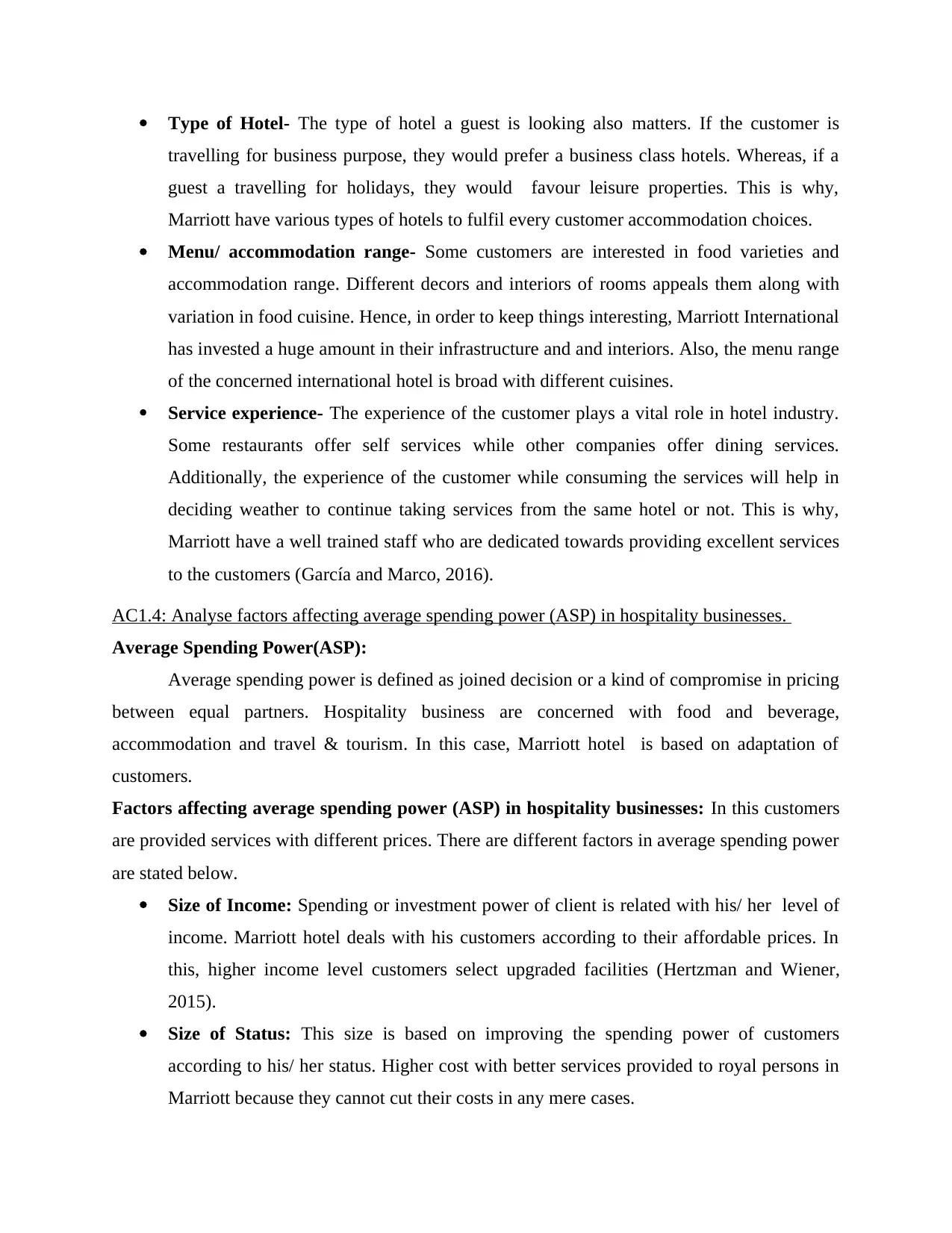
Type of Hotel- The type of hotel a guest is looking also matters. If the customer is
travelling for business purpose, they would prefer a business class hotels. Whereas, if a
guest a travelling for holidays, they would favour leisure properties. This is why,
Marriott have various types of hotels to fulfil every customer accommodation choices.
Menu/ accommodation range- Some customers are interested in food varieties and
accommodation range. Different decors and interiors of rooms appeals them along with
variation in food cuisine. Hence, in order to keep things interesting, Marriott International
has invested a huge amount in their infrastructure and and interiors. Also, the menu range
of the concerned international hotel is broad with different cuisines.
Service experience- The experience of the customer plays a vital role in hotel industry.
Some restaurants offer self services while other companies offer dining services.
Additionally, the experience of the customer while consuming the services will help in
deciding weather to continue taking services from the same hotel or not. This is why,
Marriott have a well trained staff who are dedicated towards providing excellent services
to the customers (García and Marco, 2016).
AC1.4: Analyse factors affecting average spending power (ASP) in hospitality businesses.
Average Spending Power(ASP):
Average spending power is defined as joined decision or a kind of compromise in pricing
between equal partners. Hospitality business are concerned with food and beverage,
accommodation and travel & tourism. In this case, Marriott hotel is based on adaptation of
customers.
Factors affecting average spending power (ASP) in hospitality businesses: In this customers
are provided services with different prices. There are different factors in average spending power
are stated below.
Size of Income: Spending or investment power of client is related with his/ her level of
income. Marriott hotel deals with his customers according to their affordable prices. In
this, higher income level customers select upgraded facilities (Hertzman and Wiener,
2015).
Size of Status: This size is based on improving the spending power of customers
according to his/ her status. Higher cost with better services provided to royal persons in
Marriott because they cannot cut their costs in any mere cases.
travelling for business purpose, they would prefer a business class hotels. Whereas, if a
guest a travelling for holidays, they would favour leisure properties. This is why,
Marriott have various types of hotels to fulfil every customer accommodation choices.
Menu/ accommodation range- Some customers are interested in food varieties and
accommodation range. Different decors and interiors of rooms appeals them along with
variation in food cuisine. Hence, in order to keep things interesting, Marriott International
has invested a huge amount in their infrastructure and and interiors. Also, the menu range
of the concerned international hotel is broad with different cuisines.
Service experience- The experience of the customer plays a vital role in hotel industry.
Some restaurants offer self services while other companies offer dining services.
Additionally, the experience of the customer while consuming the services will help in
deciding weather to continue taking services from the same hotel or not. This is why,
Marriott have a well trained staff who are dedicated towards providing excellent services
to the customers (García and Marco, 2016).
AC1.4: Analyse factors affecting average spending power (ASP) in hospitality businesses.
Average Spending Power(ASP):
Average spending power is defined as joined decision or a kind of compromise in pricing
between equal partners. Hospitality business are concerned with food and beverage,
accommodation and travel & tourism. In this case, Marriott hotel is based on adaptation of
customers.
Factors affecting average spending power (ASP) in hospitality businesses: In this customers
are provided services with different prices. There are different factors in average spending power
are stated below.
Size of Income: Spending or investment power of client is related with his/ her level of
income. Marriott hotel deals with his customers according to their affordable prices. In
this, higher income level customers select upgraded facilities (Hertzman and Wiener,
2015).
Size of Status: This size is based on improving the spending power of customers
according to his/ her status. Higher cost with better services provided to royal persons in
Marriott because they cannot cut their costs in any mere cases.
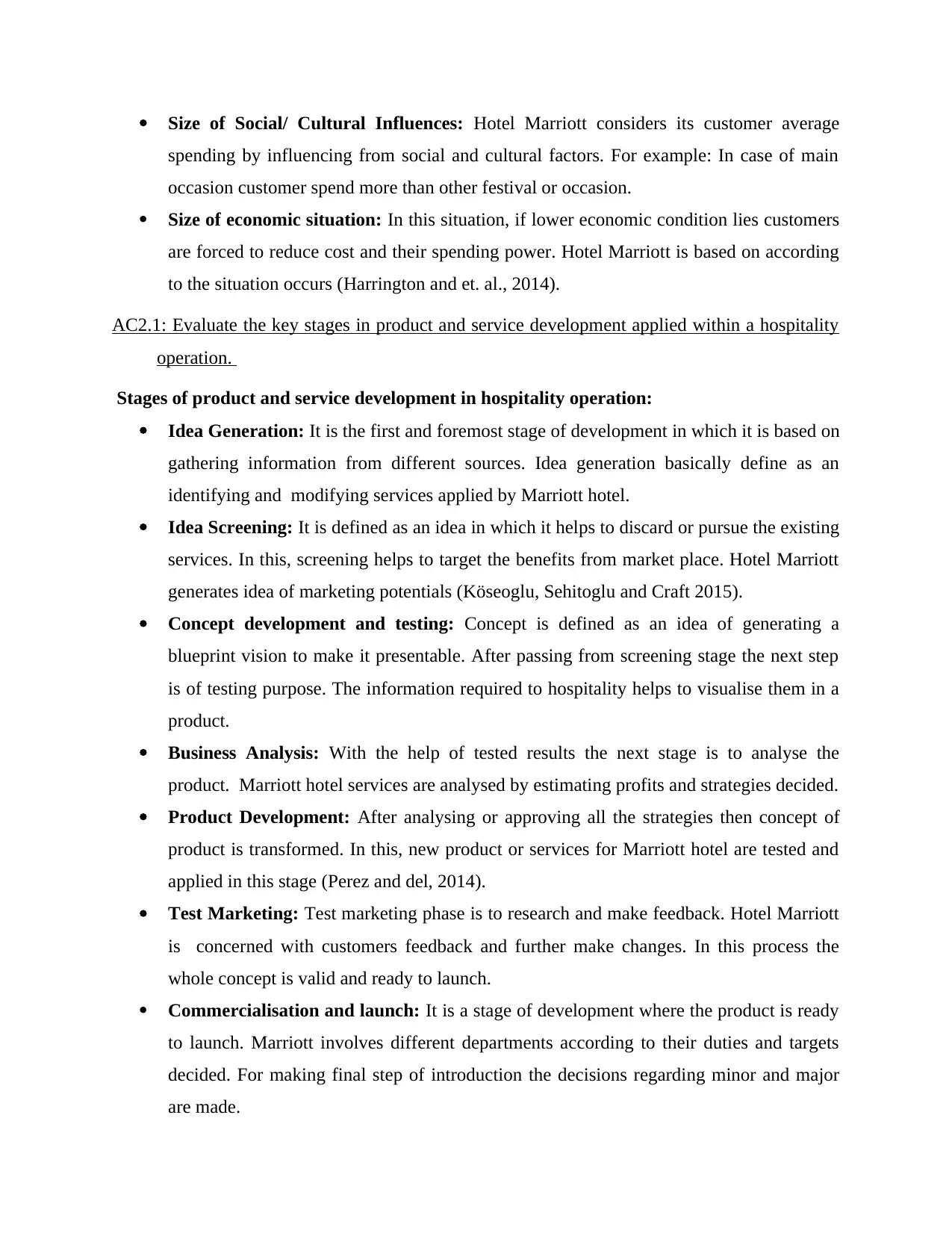
Size of Social/ Cultural Influences: Hotel Marriott considers its customer average
spending by influencing from social and cultural factors. For example: In case of main
occasion customer spend more than other festival or occasion.
Size of economic situation: In this situation, if lower economic condition lies customers
are forced to reduce cost and their spending power. Hotel Marriott is based on according
to the situation occurs (Harrington and et. al., 2014).
AC2.1: Evaluate the key stages in product and service development applied within a hospitality
operation.
Stages of product and service development in hospitality operation:
Idea Generation: It is the first and foremost stage of development in which it is based on
gathering information from different sources. Idea generation basically define as an
identifying and modifying services applied by Marriott hotel.
Idea Screening: It is defined as an idea in which it helps to discard or pursue the existing
services. In this, screening helps to target the benefits from market place. Hotel Marriott
generates idea of marketing potentials (Köseoglu, Sehitoglu and Craft 2015).
Concept development and testing: Concept is defined as an idea of generating a
blueprint vision to make it presentable. After passing from screening stage the next step
is of testing purpose. The information required to hospitality helps to visualise them in a
product.
Business Analysis: With the help of tested results the next stage is to analyse the
product. Marriott hotel services are analysed by estimating profits and strategies decided.
Product Development: After analysing or approving all the strategies then concept of
product is transformed. In this, new product or services for Marriott hotel are tested and
applied in this stage (Perez and del, 2014).
Test Marketing: Test marketing phase is to research and make feedback. Hotel Marriott
is concerned with customers feedback and further make changes. In this process the
whole concept is valid and ready to launch.
Commercialisation and launch: It is a stage of development where the product is ready
to launch. Marriott involves different departments according to their duties and targets
decided. For making final step of introduction the decisions regarding minor and major
are made.
spending by influencing from social and cultural factors. For example: In case of main
occasion customer spend more than other festival or occasion.
Size of economic situation: In this situation, if lower economic condition lies customers
are forced to reduce cost and their spending power. Hotel Marriott is based on according
to the situation occurs (Harrington and et. al., 2014).
AC2.1: Evaluate the key stages in product and service development applied within a hospitality
operation.
Stages of product and service development in hospitality operation:
Idea Generation: It is the first and foremost stage of development in which it is based on
gathering information from different sources. Idea generation basically define as an
identifying and modifying services applied by Marriott hotel.
Idea Screening: It is defined as an idea in which it helps to discard or pursue the existing
services. In this, screening helps to target the benefits from market place. Hotel Marriott
generates idea of marketing potentials (Köseoglu, Sehitoglu and Craft 2015).
Concept development and testing: Concept is defined as an idea of generating a
blueprint vision to make it presentable. After passing from screening stage the next step
is of testing purpose. The information required to hospitality helps to visualise them in a
product.
Business Analysis: With the help of tested results the next stage is to analyse the
product. Marriott hotel services are analysed by estimating profits and strategies decided.
Product Development: After analysing or approving all the strategies then concept of
product is transformed. In this, new product or services for Marriott hotel are tested and
applied in this stage (Perez and del, 2014).
Test Marketing: Test marketing phase is to research and make feedback. Hotel Marriott
is concerned with customers feedback and further make changes. In this process the
whole concept is valid and ready to launch.
Commercialisation and launch: It is a stage of development where the product is ready
to launch. Marriott involves different departments according to their duties and targets
decided. For making final step of introduction the decisions regarding minor and major
are made.
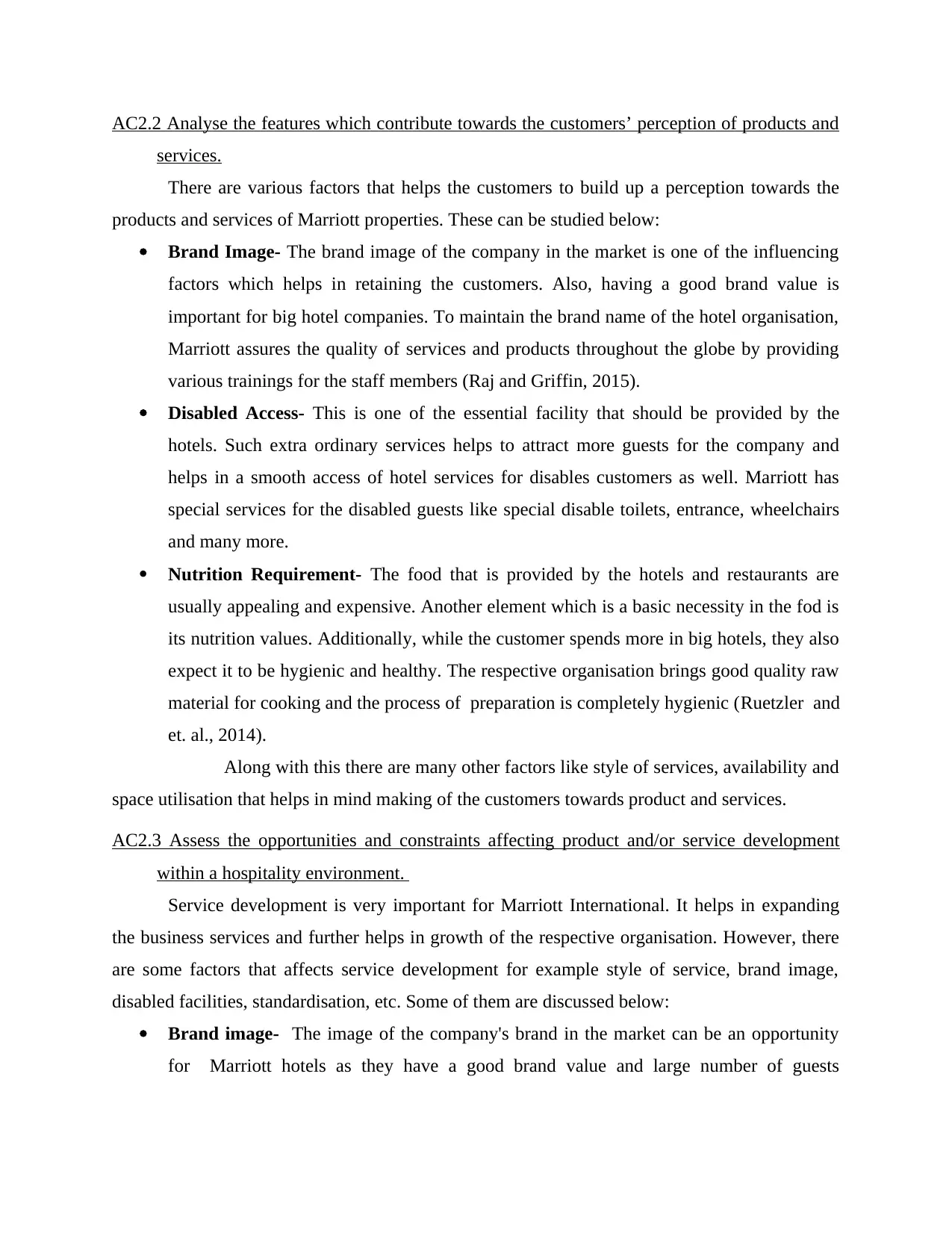
AC2.2 Analyse the features which contribute towards the customers’ perception of products and
services.
There are various factors that helps the customers to build up a perception towards the
products and services of Marriott properties. These can be studied below:
Brand Image- The brand image of the company in the market is one of the influencing
factors which helps in retaining the customers. Also, having a good brand value is
important for big hotel companies. To maintain the brand name of the hotel organisation,
Marriott assures the quality of services and products throughout the globe by providing
various trainings for the staff members (Raj and Griffin, 2015).
Disabled Access- This is one of the essential facility that should be provided by the
hotels. Such extra ordinary services helps to attract more guests for the company and
helps in a smooth access of hotel services for disables customers as well. Marriott has
special services for the disabled guests like special disable toilets, entrance, wheelchairs
and many more.
Nutrition Requirement- The food that is provided by the hotels and restaurants are
usually appealing and expensive. Another element which is a basic necessity in the fod is
its nutrition values. Additionally, while the customer spends more in big hotels, they also
expect it to be hygienic and healthy. The respective organisation brings good quality raw
material for cooking and the process of preparation is completely hygienic (Ruetzler and
et. al., 2014).
Along with this there are many other factors like style of services, availability and
space utilisation that helps in mind making of the customers towards product and services.
AC2.3 Assess the opportunities and constraints affecting product and/or service development
within a hospitality environment.
Service development is very important for Marriott International. It helps in expanding
the business services and further helps in growth of the respective organisation. However, there
are some factors that affects service development for example style of service, brand image,
disabled facilities, standardisation, etc. Some of them are discussed below:
Brand image- The image of the company's brand in the market can be an opportunity
for Marriott hotels as they have a good brand value and large number of guests
services.
There are various factors that helps the customers to build up a perception towards the
products and services of Marriott properties. These can be studied below:
Brand Image- The brand image of the company in the market is one of the influencing
factors which helps in retaining the customers. Also, having a good brand value is
important for big hotel companies. To maintain the brand name of the hotel organisation,
Marriott assures the quality of services and products throughout the globe by providing
various trainings for the staff members (Raj and Griffin, 2015).
Disabled Access- This is one of the essential facility that should be provided by the
hotels. Such extra ordinary services helps to attract more guests for the company and
helps in a smooth access of hotel services for disables customers as well. Marriott has
special services for the disabled guests like special disable toilets, entrance, wheelchairs
and many more.
Nutrition Requirement- The food that is provided by the hotels and restaurants are
usually appealing and expensive. Another element which is a basic necessity in the fod is
its nutrition values. Additionally, while the customer spends more in big hotels, they also
expect it to be hygienic and healthy. The respective organisation brings good quality raw
material for cooking and the process of preparation is completely hygienic (Ruetzler and
et. al., 2014).
Along with this there are many other factors like style of services, availability and
space utilisation that helps in mind making of the customers towards product and services.
AC2.3 Assess the opportunities and constraints affecting product and/or service development
within a hospitality environment.
Service development is very important for Marriott International. It helps in expanding
the business services and further helps in growth of the respective organisation. However, there
are some factors that affects service development for example style of service, brand image,
disabled facilities, standardisation, etc. Some of them are discussed below:
Brand image- The image of the company's brand in the market can be an opportunity
for Marriott hotels as they have a good brand value and large number of guests
Paraphrase This Document
Need a fresh take? Get an instant paraphrase of this document with our AI Paraphraser
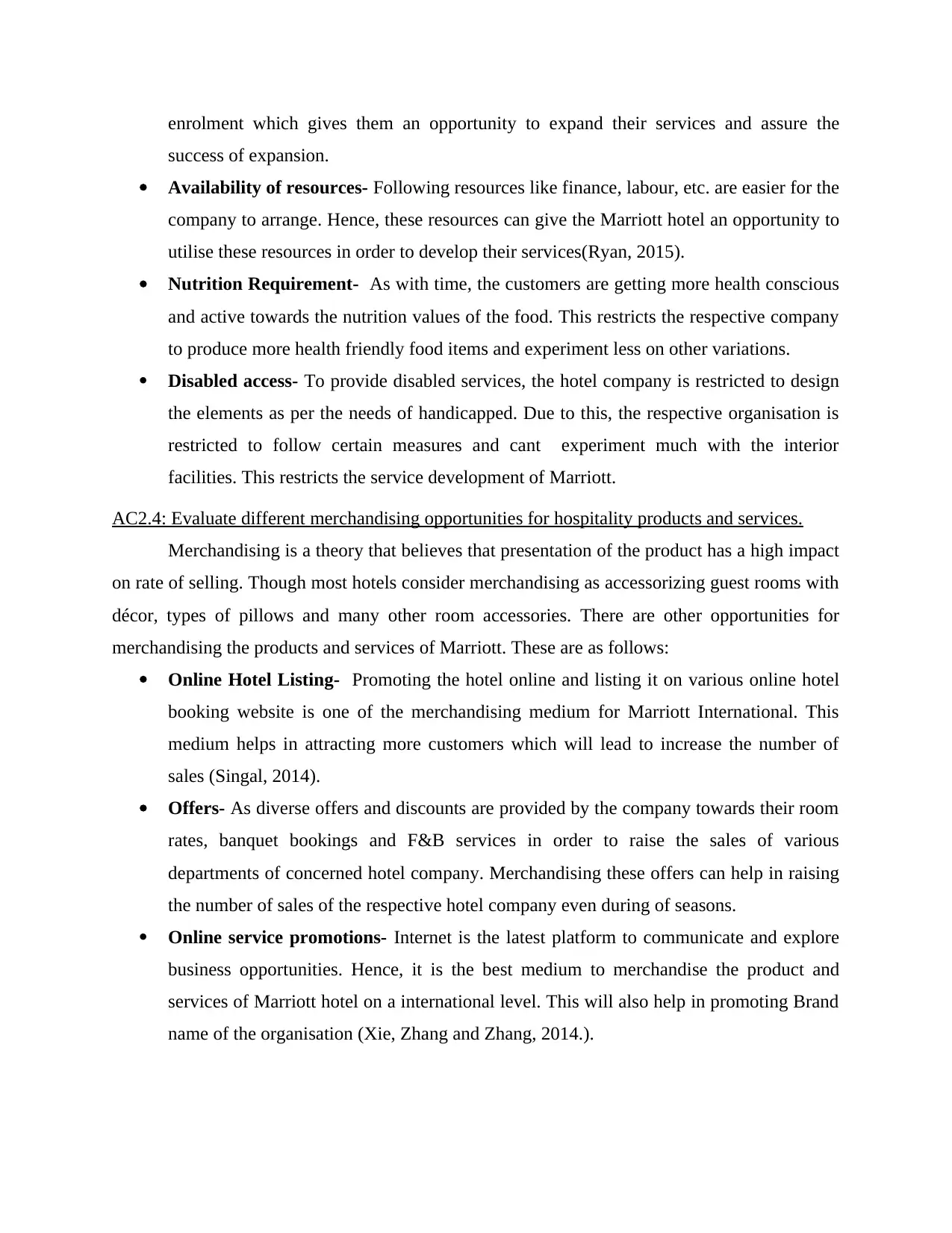
enrolment which gives them an opportunity to expand their services and assure the
success of expansion.
Availability of resources- Following resources like finance, labour, etc. are easier for the
company to arrange. Hence, these resources can give the Marriott hotel an opportunity to
utilise these resources in order to develop their services(Ryan, 2015).
Nutrition Requirement- As with time, the customers are getting more health conscious
and active towards the nutrition values of the food. This restricts the respective company
to produce more health friendly food items and experiment less on other variations.
Disabled access- To provide disabled services, the hotel company is restricted to design
the elements as per the needs of handicapped. Due to this, the respective organisation is
restricted to follow certain measures and cant experiment much with the interior
facilities. This restricts the service development of Marriott.
AC2.4: Evaluate different merchandising opportunities for hospitality products and services.
Merchandising is a theory that believes that presentation of the product has a high impact
on rate of selling. Though most hotels consider merchandising as accessorizing guest rooms with
décor, types of pillows and many other room accessories. There are other opportunities for
merchandising the products and services of Marriott. These are as follows:
Online Hotel Listing- Promoting the hotel online and listing it on various online hotel
booking website is one of the merchandising medium for Marriott International. This
medium helps in attracting more customers which will lead to increase the number of
sales (Singal, 2014).
Offers- As diverse offers and discounts are provided by the company towards their room
rates, banquet bookings and F&B services in order to raise the sales of various
departments of concerned hotel company. Merchandising these offers can help in raising
the number of sales of the respective hotel company even during of seasons.
Online service promotions- Internet is the latest platform to communicate and explore
business opportunities. Hence, it is the best medium to merchandise the product and
services of Marriott hotel on a international level. This will also help in promoting Brand
name of the organisation (Xie, Zhang and Zhang, 2014.).
success of expansion.
Availability of resources- Following resources like finance, labour, etc. are easier for the
company to arrange. Hence, these resources can give the Marriott hotel an opportunity to
utilise these resources in order to develop their services(Ryan, 2015).
Nutrition Requirement- As with time, the customers are getting more health conscious
and active towards the nutrition values of the food. This restricts the respective company
to produce more health friendly food items and experiment less on other variations.
Disabled access- To provide disabled services, the hotel company is restricted to design
the elements as per the needs of handicapped. Due to this, the respective organisation is
restricted to follow certain measures and cant experiment much with the interior
facilities. This restricts the service development of Marriott.
AC2.4: Evaluate different merchandising opportunities for hospitality products and services.
Merchandising is a theory that believes that presentation of the product has a high impact
on rate of selling. Though most hotels consider merchandising as accessorizing guest rooms with
décor, types of pillows and many other room accessories. There are other opportunities for
merchandising the products and services of Marriott. These are as follows:
Online Hotel Listing- Promoting the hotel online and listing it on various online hotel
booking website is one of the merchandising medium for Marriott International. This
medium helps in attracting more customers which will lead to increase the number of
sales (Singal, 2014).
Offers- As diverse offers and discounts are provided by the company towards their room
rates, banquet bookings and F&B services in order to raise the sales of various
departments of concerned hotel company. Merchandising these offers can help in raising
the number of sales of the respective hotel company even during of seasons.
Online service promotions- Internet is the latest platform to communicate and explore
business opportunities. Hence, it is the best medium to merchandise the product and
services of Marriott hotel on a international level. This will also help in promoting Brand
name of the organisation (Xie, Zhang and Zhang, 2014.).
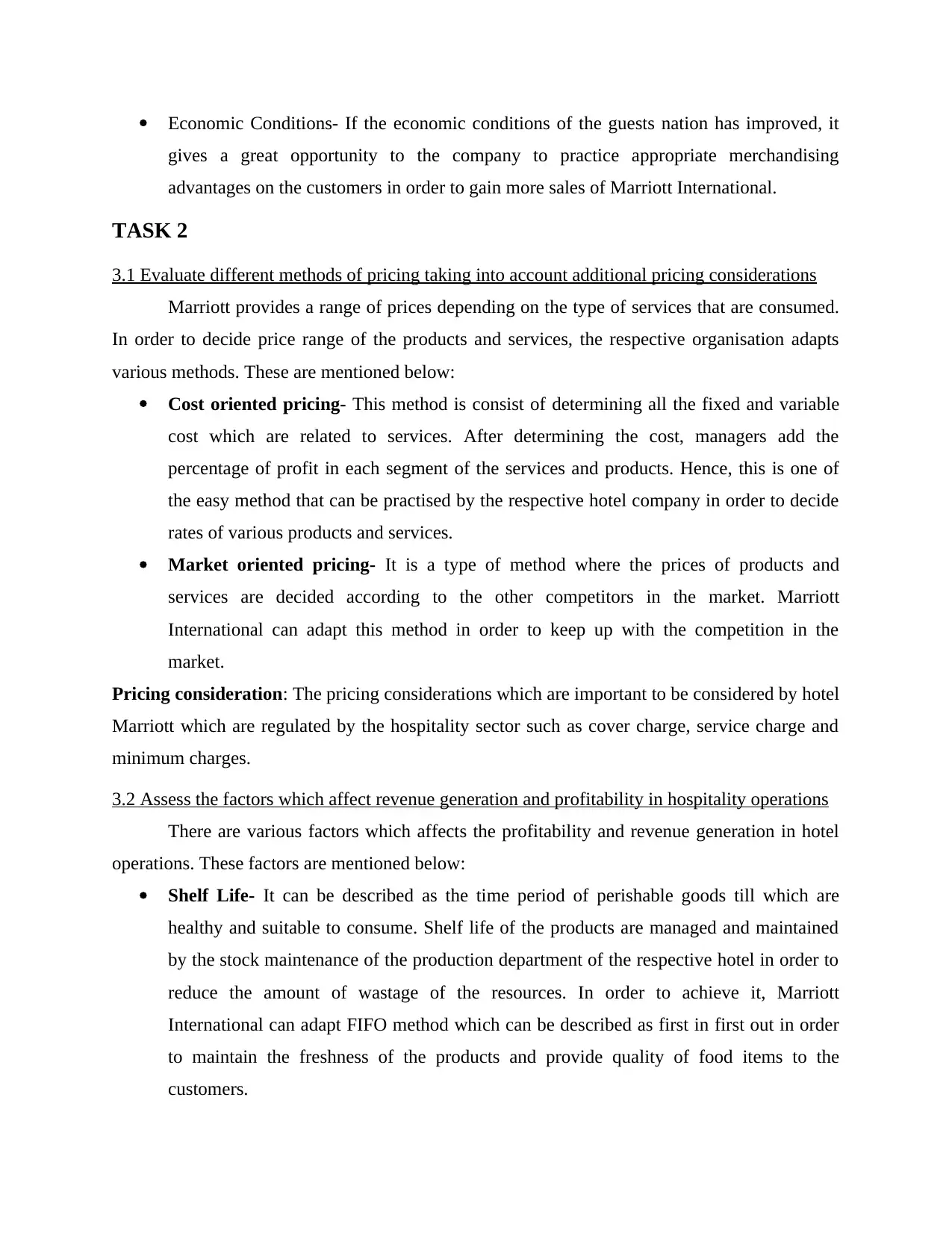
Economic Conditions- If the economic conditions of the guests nation has improved, it
gives a great opportunity to the company to practice appropriate merchandising
advantages on the customers in order to gain more sales of Marriott International.
TASK 2
3.1 Evaluate different methods of pricing taking into account additional pricing considerations
Marriott provides a range of prices depending on the type of services that are consumed.
In order to decide price range of the products and services, the respective organisation adapts
various methods. These are mentioned below:
Cost oriented pricing- This method is consist of determining all the fixed and variable
cost which are related to services. After determining the cost, managers add the
percentage of profit in each segment of the services and products. Hence, this is one of
the easy method that can be practised by the respective hotel company in order to decide
rates of various products and services.
Market oriented pricing- It is a type of method where the prices of products and
services are decided according to the other competitors in the market. Marriott
International can adapt this method in order to keep up with the competition in the
market.
Pricing consideration: The pricing considerations which are important to be considered by hotel
Marriott which are regulated by the hospitality sector such as cover charge, service charge and
minimum charges.
3.2 Assess the factors which affect revenue generation and profitability in hospitality operations
There are various factors which affects the profitability and revenue generation in hotel
operations. These factors are mentioned below:
Shelf Life- It can be described as the time period of perishable goods till which are
healthy and suitable to consume. Shelf life of the products are managed and maintained
by the stock maintenance of the production department of the respective hotel in order to
reduce the amount of wastage of the resources. In order to achieve it, Marriott
International can adapt FIFO method which can be described as first in first out in order
to maintain the freshness of the products and provide quality of food items to the
customers.
gives a great opportunity to the company to practice appropriate merchandising
advantages on the customers in order to gain more sales of Marriott International.
TASK 2
3.1 Evaluate different methods of pricing taking into account additional pricing considerations
Marriott provides a range of prices depending on the type of services that are consumed.
In order to decide price range of the products and services, the respective organisation adapts
various methods. These are mentioned below:
Cost oriented pricing- This method is consist of determining all the fixed and variable
cost which are related to services. After determining the cost, managers add the
percentage of profit in each segment of the services and products. Hence, this is one of
the easy method that can be practised by the respective hotel company in order to decide
rates of various products and services.
Market oriented pricing- It is a type of method where the prices of products and
services are decided according to the other competitors in the market. Marriott
International can adapt this method in order to keep up with the competition in the
market.
Pricing consideration: The pricing considerations which are important to be considered by hotel
Marriott which are regulated by the hospitality sector such as cover charge, service charge and
minimum charges.
3.2 Assess the factors which affect revenue generation and profitability in hospitality operations
There are various factors which affects the profitability and revenue generation in hotel
operations. These factors are mentioned below:
Shelf Life- It can be described as the time period of perishable goods till which are
healthy and suitable to consume. Shelf life of the products are managed and maintained
by the stock maintenance of the production department of the respective hotel in order to
reduce the amount of wastage of the resources. In order to achieve it, Marriott
International can adapt FIFO method which can be described as first in first out in order
to maintain the freshness of the products and provide quality of food items to the
customers.
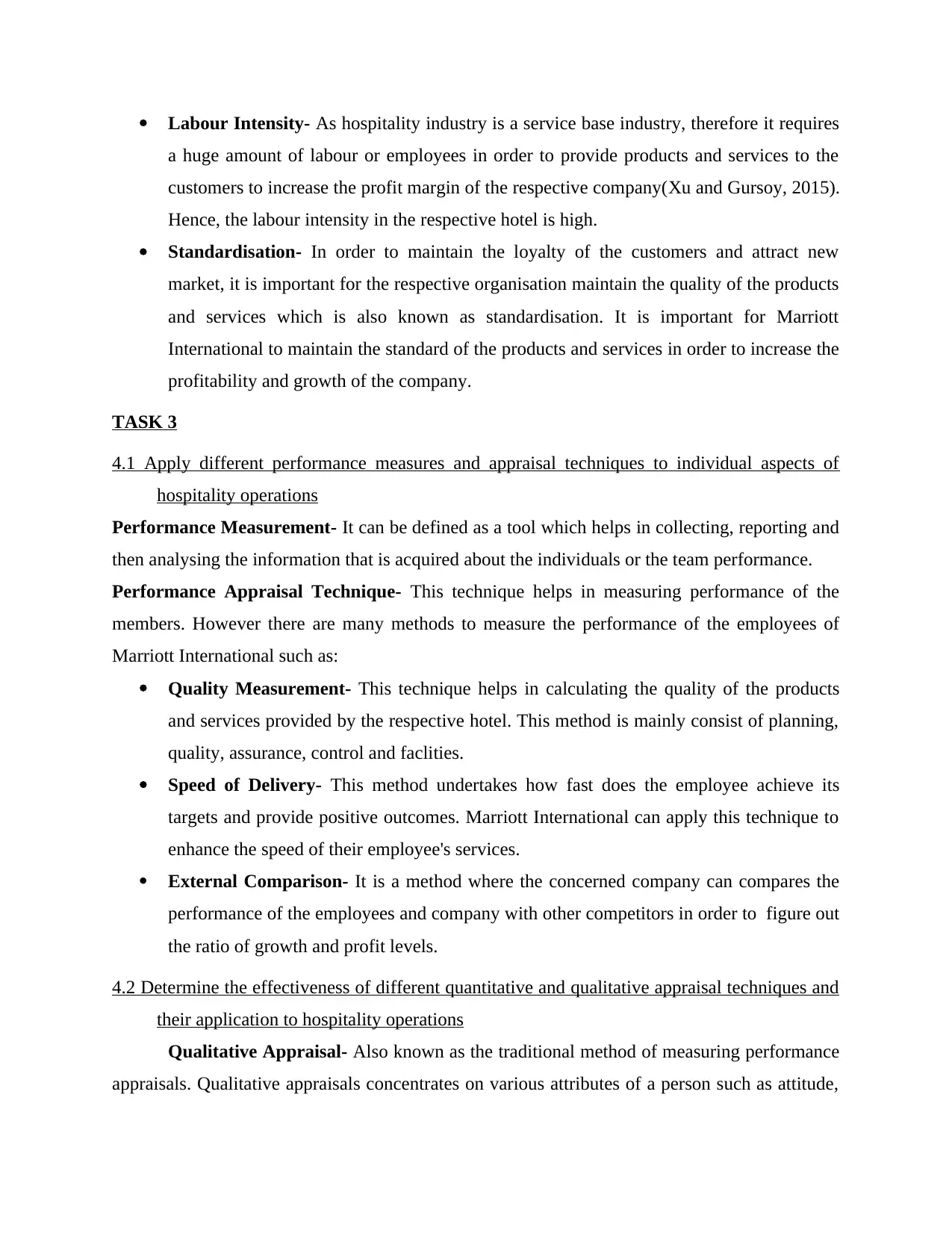
Labour Intensity- As hospitality industry is a service base industry, therefore it requires
a huge amount of labour or employees in order to provide products and services to the
customers to increase the profit margin of the respective company(Xu and Gursoy, 2015).
Hence, the labour intensity in the respective hotel is high.
Standardisation- In order to maintain the loyalty of the customers and attract new
market, it is important for the respective organisation maintain the quality of the products
and services which is also known as standardisation. It is important for Marriott
International to maintain the standard of the products and services in order to increase the
profitability and growth of the company.
TASK 3
4.1 Apply different performance measures and appraisal techniques to individual aspects of
hospitality operations
Performance Measurement- It can be defined as a tool which helps in collecting, reporting and
then analysing the information that is acquired about the individuals or the team performance.
Performance Appraisal Technique- This technique helps in measuring performance of the
members. However there are many methods to measure the performance of the employees of
Marriott International such as:
Quality Measurement- This technique helps in calculating the quality of the products
and services provided by the respective hotel. This method is mainly consist of planning,
quality, assurance, control and faclities.
Speed of Delivery- This method undertakes how fast does the employee achieve its
targets and provide positive outcomes. Marriott International can apply this technique to
enhance the speed of their employee's services.
External Comparison- It is a method where the concerned company can compares the
performance of the employees and company with other competitors in order to figure out
the ratio of growth and profit levels.
4.2 Determine the effectiveness of different quantitative and qualitative appraisal techniques and
their application to hospitality operations
Qualitative Appraisal- Also known as the traditional method of measuring performance
appraisals. Qualitative appraisals concentrates on various attributes of a person such as attitude,
a huge amount of labour or employees in order to provide products and services to the
customers to increase the profit margin of the respective company(Xu and Gursoy, 2015).
Hence, the labour intensity in the respective hotel is high.
Standardisation- In order to maintain the loyalty of the customers and attract new
market, it is important for the respective organisation maintain the quality of the products
and services which is also known as standardisation. It is important for Marriott
International to maintain the standard of the products and services in order to increase the
profitability and growth of the company.
TASK 3
4.1 Apply different performance measures and appraisal techniques to individual aspects of
hospitality operations
Performance Measurement- It can be defined as a tool which helps in collecting, reporting and
then analysing the information that is acquired about the individuals or the team performance.
Performance Appraisal Technique- This technique helps in measuring performance of the
members. However there are many methods to measure the performance of the employees of
Marriott International such as:
Quality Measurement- This technique helps in calculating the quality of the products
and services provided by the respective hotel. This method is mainly consist of planning,
quality, assurance, control and faclities.
Speed of Delivery- This method undertakes how fast does the employee achieve its
targets and provide positive outcomes. Marriott International can apply this technique to
enhance the speed of their employee's services.
External Comparison- It is a method where the concerned company can compares the
performance of the employees and company with other competitors in order to figure out
the ratio of growth and profit levels.
4.2 Determine the effectiveness of different quantitative and qualitative appraisal techniques and
their application to hospitality operations
Qualitative Appraisal- Also known as the traditional method of measuring performance
appraisals. Qualitative appraisals concentrates on various attributes of a person such as attitude,
Secure Best Marks with AI Grader
Need help grading? Try our AI Grader for instant feedback on your assignments.
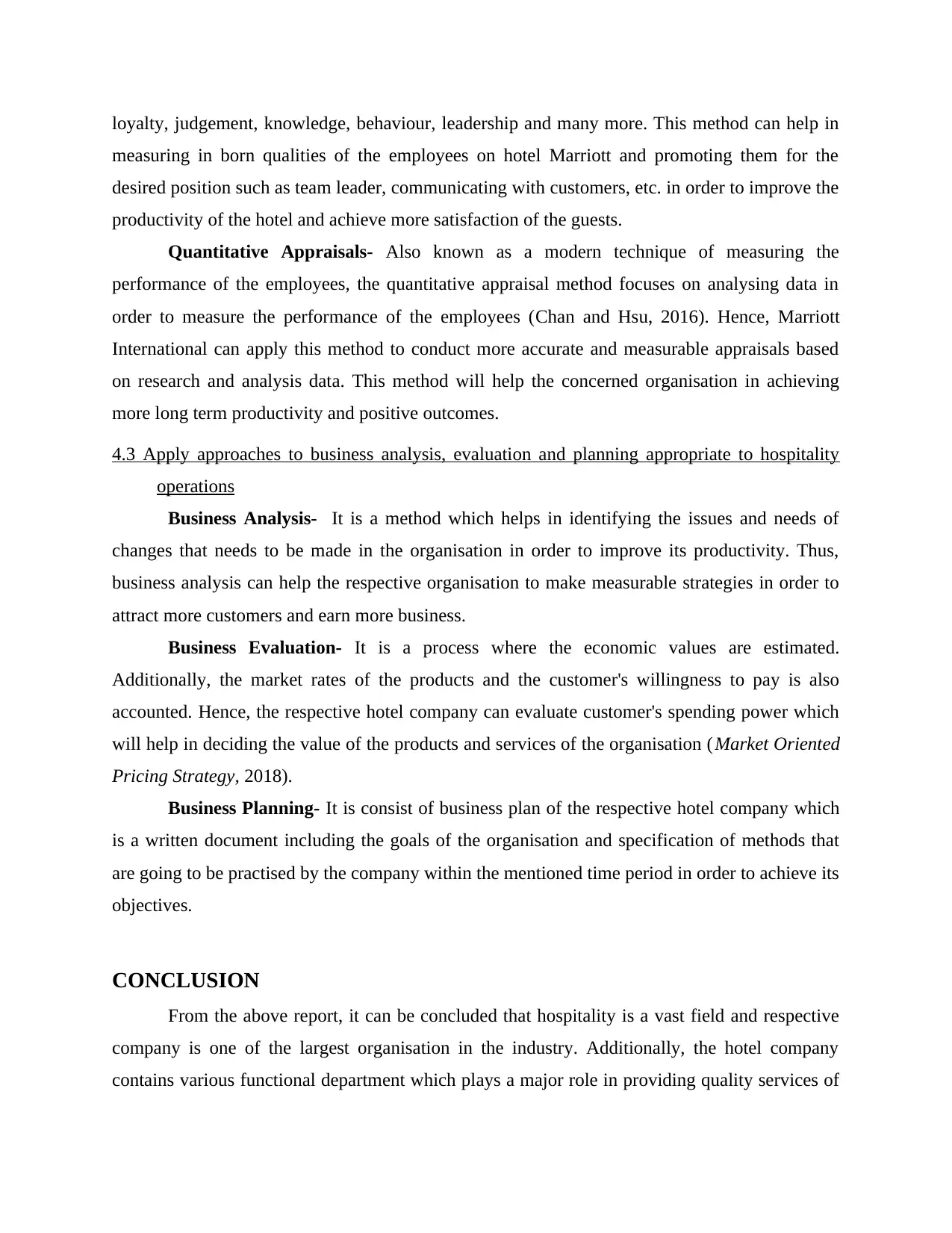
loyalty, judgement, knowledge, behaviour, leadership and many more. This method can help in
measuring in born qualities of the employees on hotel Marriott and promoting them for the
desired position such as team leader, communicating with customers, etc. in order to improve the
productivity of the hotel and achieve more satisfaction of the guests.
Quantitative Appraisals- Also known as a modern technique of measuring the
performance of the employees, the quantitative appraisal method focuses on analysing data in
order to measure the performance of the employees (Chan and Hsu, 2016). Hence, Marriott
International can apply this method to conduct more accurate and measurable appraisals based
on research and analysis data. This method will help the concerned organisation in achieving
more long term productivity and positive outcomes.
4.3 Apply approaches to business analysis, evaluation and planning appropriate to hospitality
operations
Business Analysis- It is a method which helps in identifying the issues and needs of
changes that needs to be made in the organisation in order to improve its productivity. Thus,
business analysis can help the respective organisation to make measurable strategies in order to
attract more customers and earn more business.
Business Evaluation- It is a process where the economic values are estimated.
Additionally, the market rates of the products and the customer's willingness to pay is also
accounted. Hence, the respective hotel company can evaluate customer's spending power which
will help in deciding the value of the products and services of the organisation (Market Oriented
Pricing Strategy, 2018).
Business Planning- It is consist of business plan of the respective hotel company which
is a written document including the goals of the organisation and specification of methods that
are going to be practised by the company within the mentioned time period in order to achieve its
objectives.
CONCLUSION
From the above report, it can be concluded that hospitality is a vast field and respective
company is one of the largest organisation in the industry. Additionally, the hotel company
contains various functional department which plays a major role in providing quality services of
measuring in born qualities of the employees on hotel Marriott and promoting them for the
desired position such as team leader, communicating with customers, etc. in order to improve the
productivity of the hotel and achieve more satisfaction of the guests.
Quantitative Appraisals- Also known as a modern technique of measuring the
performance of the employees, the quantitative appraisal method focuses on analysing data in
order to measure the performance of the employees (Chan and Hsu, 2016). Hence, Marriott
International can apply this method to conduct more accurate and measurable appraisals based
on research and analysis data. This method will help the concerned organisation in achieving
more long term productivity and positive outcomes.
4.3 Apply approaches to business analysis, evaluation and planning appropriate to hospitality
operations
Business Analysis- It is a method which helps in identifying the issues and needs of
changes that needs to be made in the organisation in order to improve its productivity. Thus,
business analysis can help the respective organisation to make measurable strategies in order to
attract more customers and earn more business.
Business Evaluation- It is a process where the economic values are estimated.
Additionally, the market rates of the products and the customer's willingness to pay is also
accounted. Hence, the respective hotel company can evaluate customer's spending power which
will help in deciding the value of the products and services of the organisation (Market Oriented
Pricing Strategy, 2018).
Business Planning- It is consist of business plan of the respective hotel company which
is a written document including the goals of the organisation and specification of methods that
are going to be practised by the company within the mentioned time period in order to achieve its
objectives.
CONCLUSION
From the above report, it can be concluded that hospitality is a vast field and respective
company is one of the largest organisation in the industry. Additionally, the hotel company
contains various functional department which plays a major role in providing quality services of
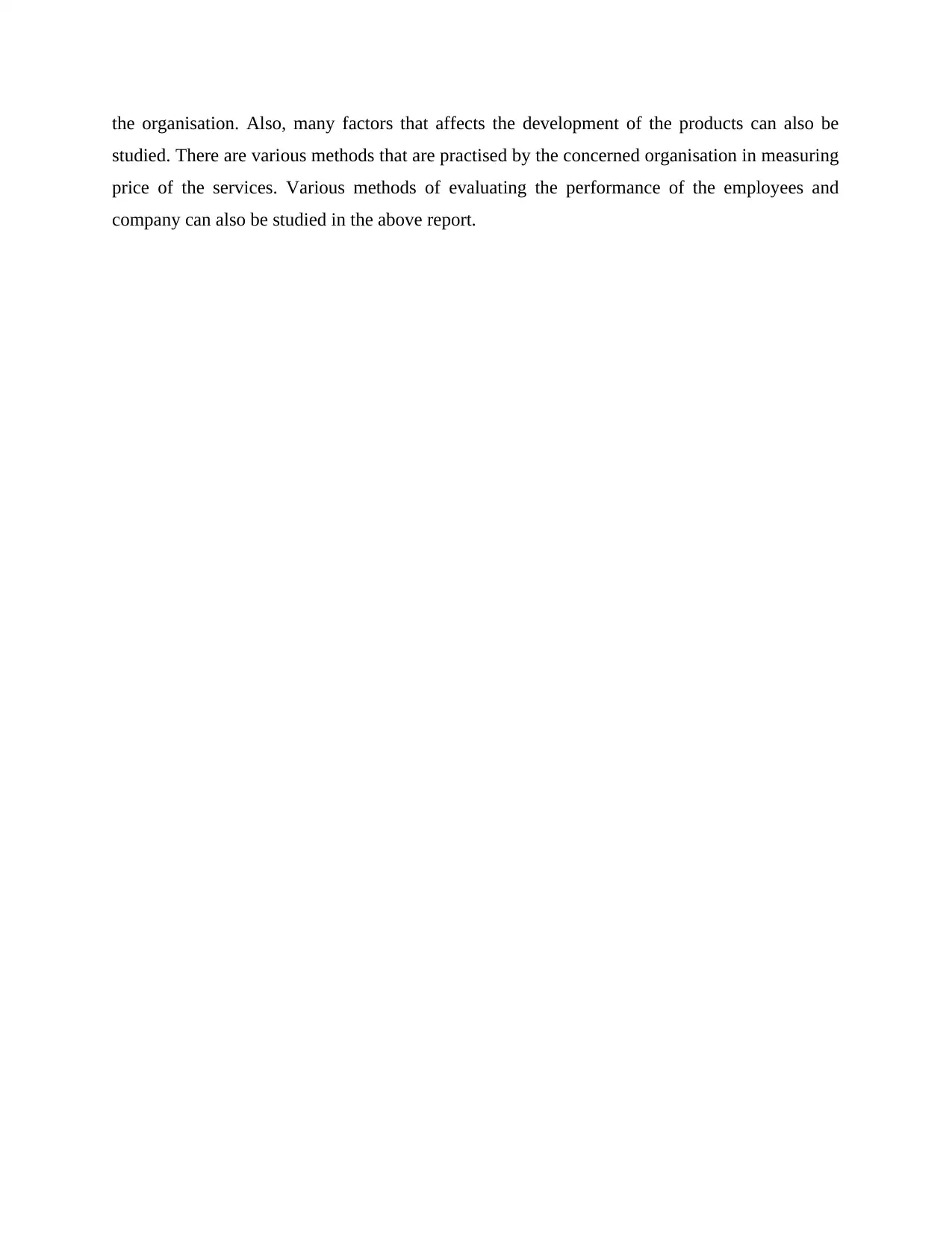
the organisation. Also, many factors that affects the development of the products can also be
studied. There are various methods that are practised by the concerned organisation in measuring
price of the services. Various methods of evaluating the performance of the employees and
company can also be studied in the above report.
studied. There are various methods that are practised by the concerned organisation in measuring
price of the services. Various methods of evaluating the performance of the employees and
company can also be studied in the above report.
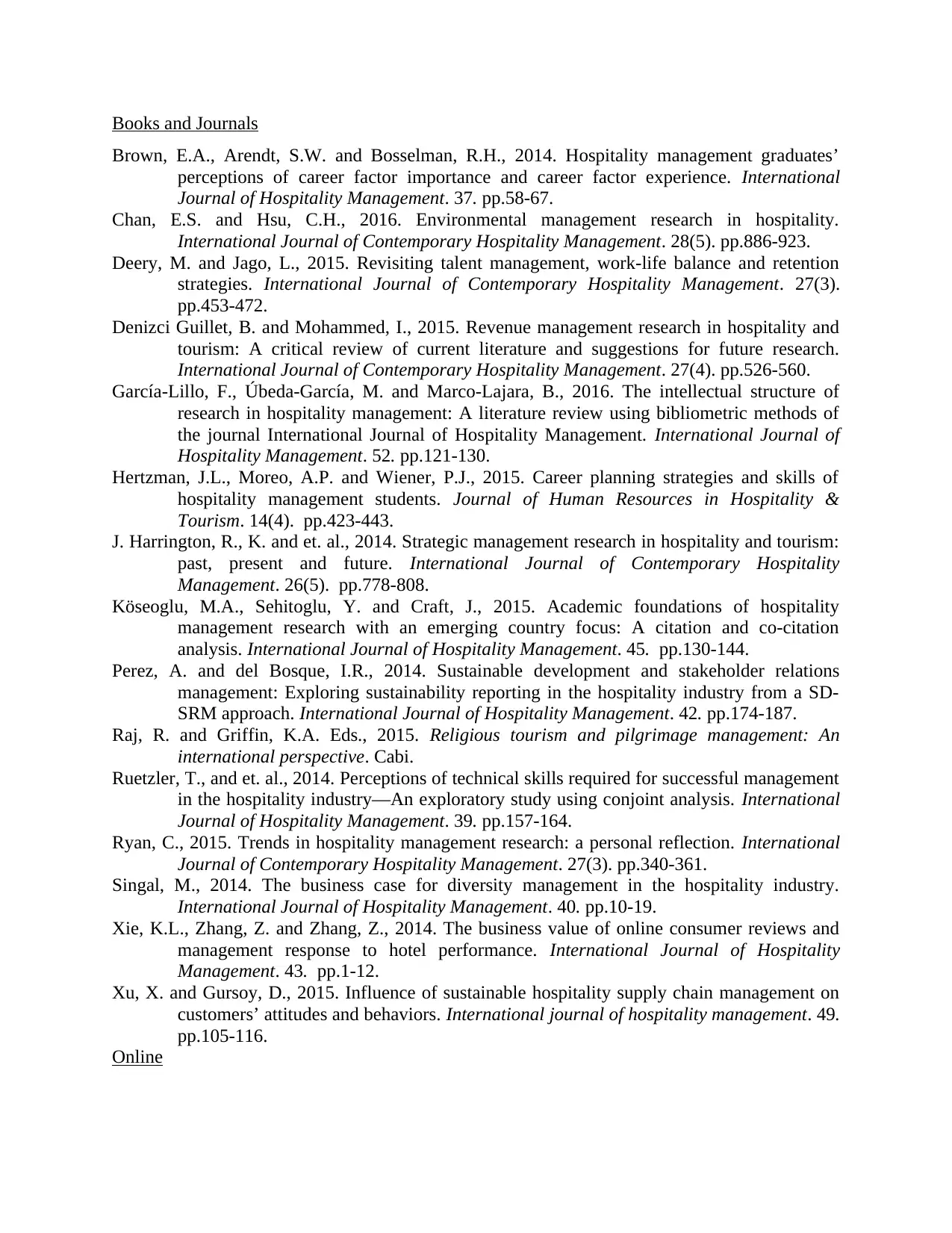
Books and Journals
Brown, E.A., Arendt, S.W. and Bosselman, R.H., 2014. Hospitality management graduates’
perceptions of career factor importance and career factor experience. International
Journal of Hospitality Management. 37. pp.58-67.
Chan, E.S. and Hsu, C.H., 2016. Environmental management research in hospitality.
International Journal of Contemporary Hospitality Management. 28(5). pp.886-923.
Deery, M. and Jago, L., 2015. Revisiting talent management, work-life balance and retention
strategies. International Journal of Contemporary Hospitality Management. 27(3).
pp.453-472.
Denizci Guillet, B. and Mohammed, I., 2015. Revenue management research in hospitality and
tourism: A critical review of current literature and suggestions for future research.
International Journal of Contemporary Hospitality Management. 27(4). pp.526-560.
García-Lillo, F., Úbeda-García, M. and Marco-Lajara, B., 2016. The intellectual structure of
research in hospitality management: A literature review using bibliometric methods of
the journal International Journal of Hospitality Management. International Journal of
Hospitality Management. 52. pp.121-130.
Hertzman, J.L., Moreo, A.P. and Wiener, P.J., 2015. Career planning strategies and skills of
hospitality management students. Journal of Human Resources in Hospitality &
Tourism. 14(4). pp.423-443.
J. Harrington, R., K. and et. al., 2014. Strategic management research in hospitality and tourism:
past, present and future. International Journal of Contemporary Hospitality
Management. 26(5). pp.778-808.
Köseoglu, M.A., Sehitoglu, Y. and Craft, J., 2015. Academic foundations of hospitality
management research with an emerging country focus: A citation and co-citation
analysis. International Journal of Hospitality Management. 45. pp.130-144.
Perez, A. and del Bosque, I.R., 2014. Sustainable development and stakeholder relations
management: Exploring sustainability reporting in the hospitality industry from a SD-
SRM approach. International Journal of Hospitality Management. 42. pp.174-187.
Raj, R. and Griffin, K.A. Eds., 2015. Religious tourism and pilgrimage management: An
international perspective. Cabi.
Ruetzler, T., and et. al., 2014. Perceptions of technical skills required for successful management
in the hospitality industry—An exploratory study using conjoint analysis. International
Journal of Hospitality Management. 39. pp.157-164.
Ryan, C., 2015. Trends in hospitality management research: a personal reflection. International
Journal of Contemporary Hospitality Management. 27(3). pp.340-361.
Singal, M., 2014. The business case for diversity management in the hospitality industry.
International Journal of Hospitality Management. 40. pp.10-19.
Xie, K.L., Zhang, Z. and Zhang, Z., 2014. The business value of online consumer reviews and
management response to hotel performance. International Journal of Hospitality
Management. 43. pp.1-12.
Xu, X. and Gursoy, D., 2015. Influence of sustainable hospitality supply chain management on
customers’ attitudes and behaviors. International journal of hospitality management. 49.
pp.105-116.
Online
Brown, E.A., Arendt, S.W. and Bosselman, R.H., 2014. Hospitality management graduates’
perceptions of career factor importance and career factor experience. International
Journal of Hospitality Management. 37. pp.58-67.
Chan, E.S. and Hsu, C.H., 2016. Environmental management research in hospitality.
International Journal of Contemporary Hospitality Management. 28(5). pp.886-923.
Deery, M. and Jago, L., 2015. Revisiting talent management, work-life balance and retention
strategies. International Journal of Contemporary Hospitality Management. 27(3).
pp.453-472.
Denizci Guillet, B. and Mohammed, I., 2015. Revenue management research in hospitality and
tourism: A critical review of current literature and suggestions for future research.
International Journal of Contemporary Hospitality Management. 27(4). pp.526-560.
García-Lillo, F., Úbeda-García, M. and Marco-Lajara, B., 2016. The intellectual structure of
research in hospitality management: A literature review using bibliometric methods of
the journal International Journal of Hospitality Management. International Journal of
Hospitality Management. 52. pp.121-130.
Hertzman, J.L., Moreo, A.P. and Wiener, P.J., 2015. Career planning strategies and skills of
hospitality management students. Journal of Human Resources in Hospitality &
Tourism. 14(4). pp.423-443.
J. Harrington, R., K. and et. al., 2014. Strategic management research in hospitality and tourism:
past, present and future. International Journal of Contemporary Hospitality
Management. 26(5). pp.778-808.
Köseoglu, M.A., Sehitoglu, Y. and Craft, J., 2015. Academic foundations of hospitality
management research with an emerging country focus: A citation and co-citation
analysis. International Journal of Hospitality Management. 45. pp.130-144.
Perez, A. and del Bosque, I.R., 2014. Sustainable development and stakeholder relations
management: Exploring sustainability reporting in the hospitality industry from a SD-
SRM approach. International Journal of Hospitality Management. 42. pp.174-187.
Raj, R. and Griffin, K.A. Eds., 2015. Religious tourism and pilgrimage management: An
international perspective. Cabi.
Ruetzler, T., and et. al., 2014. Perceptions of technical skills required for successful management
in the hospitality industry—An exploratory study using conjoint analysis. International
Journal of Hospitality Management. 39. pp.157-164.
Ryan, C., 2015. Trends in hospitality management research: a personal reflection. International
Journal of Contemporary Hospitality Management. 27(3). pp.340-361.
Singal, M., 2014. The business case for diversity management in the hospitality industry.
International Journal of Hospitality Management. 40. pp.10-19.
Xie, K.L., Zhang, Z. and Zhang, Z., 2014. The business value of online consumer reviews and
management response to hotel performance. International Journal of Hospitality
Management. 43. pp.1-12.
Xu, X. and Gursoy, D., 2015. Influence of sustainable hospitality supply chain management on
customers’ attitudes and behaviors. International journal of hospitality management. 49.
pp.105-116.
Online
Paraphrase This Document
Need a fresh take? Get an instant paraphrase of this document with our AI Paraphraser
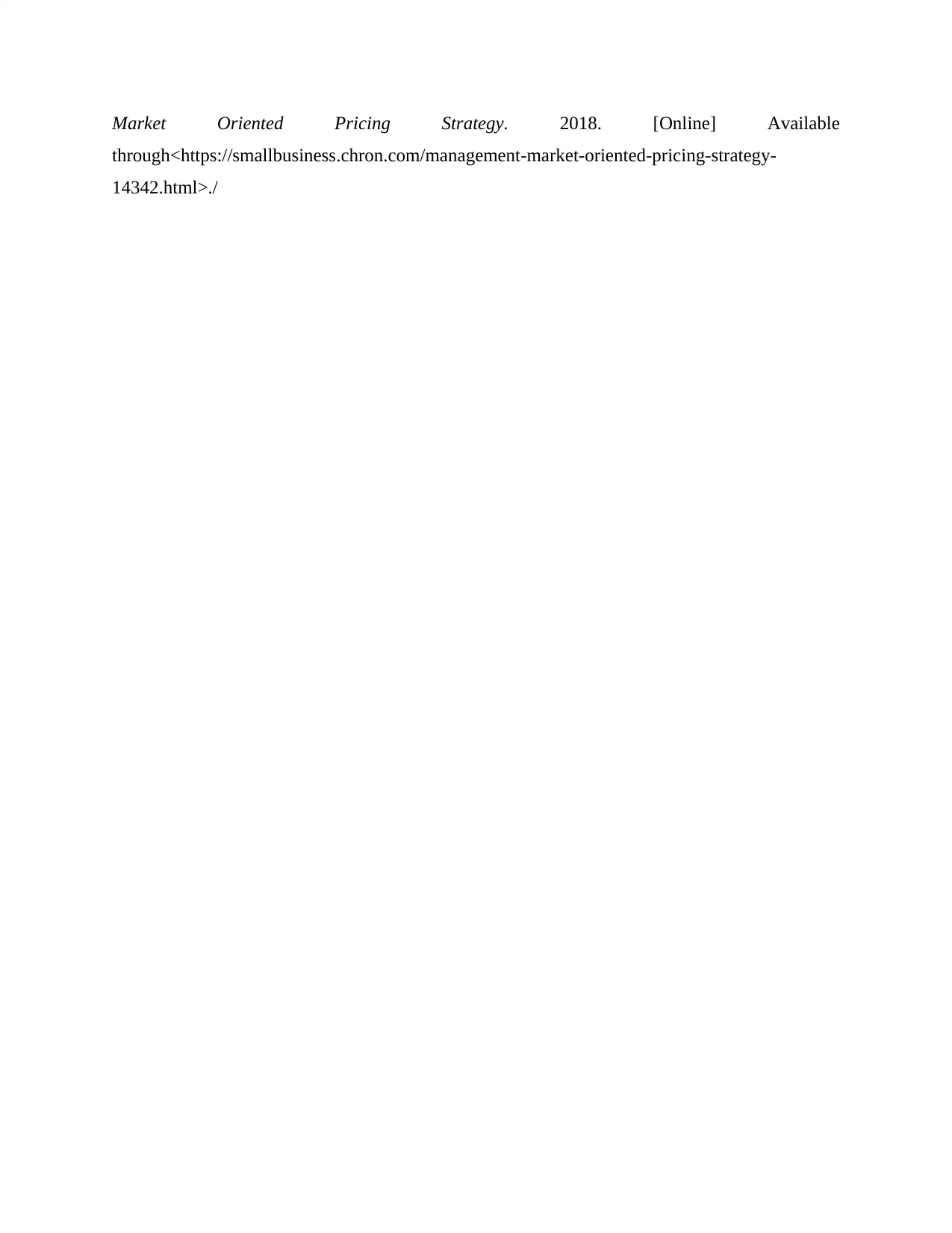
Market Oriented Pricing Strategy. 2018. [Online] Available
through<https://smallbusiness.chron.com/management-market-oriented-pricing-strategy-
14342.html>./
through<https://smallbusiness.chron.com/management-market-oriented-pricing-strategy-
14342.html>./
1 out of 14
Related Documents
Your All-in-One AI-Powered Toolkit for Academic Success.
+13062052269
info@desklib.com
Available 24*7 on WhatsApp / Email
![[object Object]](/_next/static/media/star-bottom.7253800d.svg)
Unlock your academic potential
© 2024 | Zucol Services PVT LTD | All rights reserved.





